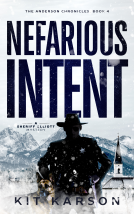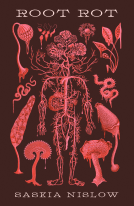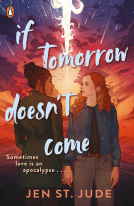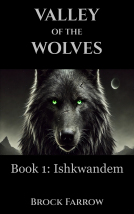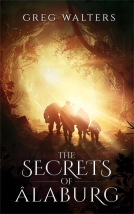
Skyward Inn
by Aliya Whiteley
This title was previously available on NetGalley and is now archived.
Send NetGalley books directly to your Kindle or Kindle app
1
To read on a Kindle or Kindle app, please add kindle@netgalley.com as an approved email address to receive files in your Amazon account. Click here for step-by-step instructions.
2
Also find your Kindle email address within your Amazon account, and enter it here.
Pub Date 16 Mar 2021 | Archive Date 9 Mar 2021
Rebellion | Solaris
Talking about this book? Use #SkywardInn #NetGalley. More hashtag tips!
Description
Drink down the brew and dream of a better Earth.
Skyward Inn, within the high walls of the Western Protectorate, is a place of safety, where people come together to tell stories of the time before the war with Qita.
But safety from what? Qita surrendered without complaint when Earth invaded; Innkeepers Jem and Isley, veterans from either side, have regrets but few scars.
Their peace is disturbed when a visitor known to Isley comes to the Inn asking for help, bringing reminders of an unnerving past and triggering an uncertain future.
Did humanity really win the war?
This is Jamaica Inn by way of Jeff Vandermeer, Ursula Le Guin, Angela Carter and Michel Faber, a beautiful story of belonging, identity and regret.
Advance Praise
"Intense and consuming writing, constantly challenging expectations." -- Adrian Tchaikovsky, Arthur C. Clarke Award-winning author of Children of Time
"A story of the future that is an appeal to the present. The best kind of science fiction. A novel of its time, confronting current and terrible misjudgements with which humanity assures its own demise. All made startling by a typical Whiteley strangeness." -- Adam Nevill, author of The Reddening & Wyrd and Other Dereliction
“Visceral and unsettling - I loved it” -- G. V. Anderson, award-winning speculative fiction author
“The absolute best kind of philosophical SF, & indisputable inheritor of Le Guin. Aliya Whiteley forces us to confront difficult ideas, but they are important, and will become even more so. Exactly what SF should do.” -- Marion Womack, author of The Golden Key
"Whiteley [is] one of the most original and provocative voices in contemporary science fiction." -- Nina Allen, author of The Rift
"Clever and touching: a book of cosmic scope but with real characters and a human heart." -- Chris Beckett, author of the award-winning Dark Eden series
"A powerful and surprising examination of colonialism and its unintended consequences. Highly recommended." -- Helen Marshall, author of The Migration
“Skyward Inn is an experience. Whiteley is a strong voice in speculative fiction and readers will be delighted and unsettled by her novels for years to come.” -- The Nerd Daily
"Whiteley takes the reader on a cryptic journey of trust, identity and knowing your place in the world." -- Starburst Magazine
"A moving and thought provoking tale, completely unlike anything I’ve read before." -- The Bibliophile Chronicles
"There are some books that are simply beautiful. And Skyward Inn by Aliya Whiteley is one of those." -- Libri Draconis
Marketing Plan
Lead title for spring 2021 backed by a major marketing campaign.
Lead title for spring 2021 backed by a major marketing campaign.
Available Editions
| EDITION | Other Format |
| ISBN | 9781781088821 |
| PRICE | US$24.99 (USD) |
| PAGES | 336 |
Featured Reviews
 Dan P, Bookseller
Dan P, Bookseller
First off, I have to give this book props on account of it being set in my home county of Devon (even if it is *spit* North Devon). The story and setting have clear antecedents in classic SF. The post technological rural lifestyle is reminiscent of the sort of thing that happens in the home stretch of John Wyndham novels, and it has other British doom guys like John Christopher and Richard Cowper in its DNA. Probably the biggest single influence is Ursula LeGuin, whose fingerprints are all over the human / alien contact and coexistence posited here.
It’s no retro exercise though - it’s quite easy to read it as a Brexit parable, and the final quarter goes on and outwards into deeply strange territory that recalls Jeff Vandermeer and a certain cult classic horror movie. Neither is it just the sum of the influences cited - Whiteley has her own ideas, and expresses them in some lovely prose, as well as crafting characters whose relationships, frustrations and temptations all ring true. It’s quiet, thoughtful and very very good.
I was sent an advanced reading copy via the Publisher though all thoughts are my own.
This was such a fascinating, weird, sad and a touch hopeful book. Not sure if I have the words adequate enough to describe this book but if you enjoy books that are weird, revolve around relations with people from another planet and a bit of traveling then this may be your kind of book.
Looking forward to what Aliya might write in the future and hopefully there will be a continuation of this world though it does end in a way that leaves a lot unanswered but open to interpretation so the potential to be a standalone is certainly there!
Trigger warnings: death, some violence, bodies fusing together
Skyward Inn, as a science fiction novel, seems ordinary at first. Off-worlders and Earthers living together in a post-apocalyptic idyllic low-technology-by-choice agrarian society. What it becomes is a surreal horrorshow, or is it a beautiful evolution into the unity of life? A parallel novel that tracks the story of a mother and son, separated early in life by choice and circumstance. The novel poses questions about identity, peace, aggression, colonialism, community, conformity, individualism, and choice. The brew, brought to Earth by the Qitans and available at Skyward Inn, makes the inn a place of collaboration, competition, and community. But what exactly is it? And what does it have to do with the strange "liquid earth" in the graveyard and the magic trick of the squatters on the neighboring farm?
 Reviewer 61181
Reviewer 61181
I should have been clued in by the psychedelic cover and the Jeff Vandermeer comparison in the blurb, but I still wasn’t quite prepared for what this book had in store for me.
It starts off almost like a space western. The story takes place in a post-apocalyptic area of England called the Western Protectorate that shuns technology and has reverted back to an agricultural society. Everything feels natural, down-to-earth. However, the story begins to slowly creep into a delirious, Lovecraftian descent of body and cosmic horror that continued to haunt me even after I finished the final pages.
Ultimately, Skyward Inn is a profound and beautifully grotesque tale about loneliness and our innate desire to belong—truly a sci-fi classic in the making.
Aliya Whiteley is one of my favorite authors. Her imagination and her writing style are gorgeous and unique. I read Skyward Inn last month and thinking back now to write the review, so many of the scenes remain vivid in my mind. The feelings the book evoked come flooding back in. Whiteley has a way of drawing you into her work and taking you on delightfully wild rides. Skyward Inn is likely to be like nothing you’ve read. I can’t write much detail without giving away the parts of the book that I loved and those that surprised me. Suffice it to say, my review could never express how amazingly inventive, ethereal, and evocative this book is. It’s so unique even for a work of speculative fiction.
Thank you to Aliya Whiteley, Rebellion Solaris, and #NetGallery for an eARC of #SkywardInn in return for an honest review. Review will be shared on NetGallery, Instagram, Goodreads, and Facebook.
When a gateway opens in space to a planet called Qita, the local inhabitants’ peaceful acquiescence of human occupation averts a war. But are their intentions really peaceful? And what happens when avaricious expansionism is faced with a force even more powerful and inexorable.
Back on earth, the Skyward Inn, run by Jem and Isley, is a gathering place within the cloistered community of the Western Protectorate, where the locals come to drink Qitan brew and share stories. But a strange sickness has begun to afflict the humans of the Protectorate, and when a stranger arrives at Skyward Inn, the harmony of Jem and Isley’s partnership is broken.
Highly recommended for fans of Jeff VanderMeer’s 'Southern Reach' trilogy, this is a surreal and thought-provoking exploration of colonialism, assimilation and identity, that is simultaneously horrifying and comforting. 'Skyward Inn' is a brilliantly unnerving blend of sinister and sincere and it will be haunting my thoughts for a while!
 Jessica G, Reviewer
Jessica G, Reviewer
Honestly it's a relief to have a quick flick through some other reviews to see that other people have struggled to rate and absorb this book. It was NOT what I was expecting at all, which doesn't mean I didn't enjoy it, but I can honestly say I have never read anything like it which makes reviewing it a challenge. I thought I was going to read a bit of a space opera romp set in an inn on some far away planet where humans thought they were in control but were actually being manipulated into thinking so. And in a way part of that assumption that is true, but but's also absolutely not what happens here.
So what did I read? We are at some point in the future and humanity has discovered a wormhole that takes them to another planet. Not everyone is happy with this high tech future and so some live in the Protectorate, a rural, broadly trading economy in the South West of England. Here Jem runs the titular inn with her partner. Trade is good because they serve Jarrowbrew, a drink common to Qita, the planet at the other end of the wormhole, a planet Earth has visited and occupied with a colonial mindset. Jem, unusually for an inhabitant of the Protectorate, has spent time on Qita. It's where she met Isley, who is one of the few Qitans on earth and especially in the Protectorate where the alien race are regarded with suspicion and hostility.
I can't really say any more because part of what makes this book so special is its absolute unpredictability. What I can say is it's thoughtful, unusual and beautifully written and definitely worth reading.
In the aftermath of an interplanetary war that appears to have been resolved peacefully, Jem, a human woman, and Isley, a Qitan from the planet attacked by humankind, run the Skyward Inn, a social hub for the local community. Serving the mysterious and renowned "brew" provided by Isley, the Skyward is situated in the Protectorate - actually a part of Devon which appears to have broken away from the UK to form a kind of cooperative paradise, with many of the trappings we might imagine of that setting, including boring meetings and people going without certain things.
Despite the bucolic setting, it's clear from the outset that not all is well. Isley the Qitan knows to stay out of people's way, and Jem is also shunned apart when she isn't playing the friendly barmaid role at the Skyward.
Meanwhile, Fosse, Jem's son, is kicking against the constraints of the Protectorate - and when he discovers a family squatting in an empty farm, they offer him the potential for escape.
But what is the strange spell that comes over Jem when she drinks Isley's brew? Why has a Qitan known to Isley appeared in the Skyward's cellar, and what is their relationship? Rumours of a new plague spreading outside the Protectorate only heighten the sense of paranoia and growing horror - especially when unsettling things start happening at home, too.
This is a short, compelling novel with evocative, absorbing prose. Whiteley slowly builds the growing sense of a world that is not what we believe - see for example her description of Fosse's panic attack early on: "...panic had set in and the wheezing started soon after, just like it used to when he had been small and scared all the time, with his mother gone away. It was not just the land that hated him then - the air itself had turned against him."
The novel raises questions about colonialism, personal autonomy, connection and violence, without necessarily posing definite answers (my favourite kind of questions) - although the ending sounds out a vital note of hope.
Thank you to Rebellion Publishing for allowing me to read an advance copy of Skyward Inn. This is the first longer piece of fiction I've read by Aliya Whiteley, and I will be seeking out more of her work now. It's also the first time since I was a child that I finished a story and turned immediately back to the beginning - finding it even more absorbing and interesting the second time through. I really, really recommend it if you like strong, evocative prose and thoughtful writing alongside compelling characters and fascinating world-building.
 Tamara R, Reviewer
Tamara R, Reviewer
The gist: Skyward Inn is a beautiful, unsettling, dreamlike book. It’s a fusion of ideas surrounding love, family, coexistence and colonisation. It’s modern science fiction that sits well with the traditional classics of the genre.
It’s a quiet book, a sense of unease and uncertainty bringing tension to the slow reveal of the past and the potential future. Whiteley gradually builds a picture of what’s happening in a future Devon and the wider planet(s), slowly filling in the gaps and the changes so the picture builds for you as much as it does for the characters.
And although it’s quiet, it also has scenes prepared to horrify and disturb. There’s violence and body horror, and a sense of danger that may or may not be manifested. And, ultimately, the question of whether in fact some of these things are horrific at all. Whitely uses alien contact and coexistence to place humanity under a magnifying glass and see what it does.
Whiteley’s writing is thoughtful with every word placed carefully, and Skyward Inn is a joy to fall in to.
Favourite line: Alone is not a place I can go to, but the place that’s left behind after everyone else has gone.
Read if: You want beautiful, thoughtful science fiction.
Read with: Your favourite brew.
Get it: Skyward Inn by Aliya Whiteley
ARC gratefully received from Rebellion, Solaris, and Netgalley
Review to be posted on release date at www.thedustlounge.com
 Lilli S, Reviewer
Lilli S, Reviewer
5 stars - unique and compelling
Well, where to start? As other reviewers have noted, this novel is not easy to describe.
The story revolves around Jem and her estranged son Fosse, who both live in the Western Protectorate, a separate society on Earth that has decided to live without technology, just like people did in the olden days. But the rest of Earth is a highly developed society that has discovered a gate to another planet, Qita, and its inhabitants, the Qitans, who never put up a fight when humans came. One of the Qitans, Isley, came to Earth and is running the local Inn with Jem, selling the popular Qitan brew. And while they love each other it is also clear that some cultural gaps cannot ever be crossed.
For the longest time I was not sure at all where the story was actually going, but I really did not mind whatsoever. I was too invested in the characters, their need for beloning, their pain, their hopes, their frustrations. The prose is beautiful, gentle and caring, yet eerie. You always feel like maybe you are missing something that lies JUST beyond your reach. I enjoyed this kind of storytelling a great lot and I had a hard time putting this down, but it most probably won't be for everyone.
I found the conclusion to the story quite satisfying in that it refused to be simple. It touches on many complex, intertwined issues and it would not do to wrap it up all nice and neat.
For me this will surely be a highlight this year and I can wholeheartedly recommend it to fans of literary sci-fi who like to read outside of the box.
 Alejandra C, Reviewer
Alejandra C, Reviewer
* Thanks to NetGalley and Solaris/Rebellion for providing an advance copy for review *
At some point in the not so distant future, a wormhole opens in Earth that gives it access to an alien civilization in planet Qita. After a tense initial encounter, Qitans peacefully surrender and let humans develop and extract resources from their planet. The story is told from the point of view of Jem, a human veteran of the Earth invasion of Qita, who now runs a pub in a village in isolationist England together with Isley, a Qitan veteran she met during her duty. Things start to change when an unexpected visitor from Qita appears.
Skyward Inn is a sci-fi first contact story that manages to be both intimate and all encompassing, in a way that reminded me of Ursula K. LeGuin. It is a beautiful, thought provoking novel that explores loneliness and belonging, with highly memorable (although a bit disturbing) imagery. It challenges your assumptions <spoiler>(specially involving conquerors and the conquered)</spoiler> and does not spoon feed you answers; it can be unnerving at some points, but it is also peaceful. The book also touches on change; it is probably not a coincidence that in the wake of Brexit, the story takes place in a village belonging to the Protectorate - a segment of England that wants to go back to old times with limited technology, and chose to secede to avoid having contact with the aliens. The story moves very slowly, the focus is on developing the characters and their relationships, but it is worth sticking with it to enjoy an extraordinary ending.
 Reviewer 496598
Reviewer 496598
I’m always on the lookout for more SFF slice of life. Especially weird literary SFF slice of life. So when a friend brought this book to my attention, I knew I’d have to read it. And it turned out to be one of the most unique things I’ve found in a while – at the same time somehow a seamless blend of super chill sci-fi slice of life (slight Becky Chambers vibes anyone?) and something altogether more unsettling.
Jem and Isley – a human and a Qitan alien – manage the titular Skyward Inn. It’s a place where people from a small village in the Protectorate, a community of humans that rejects technological progress, can share a drink and exchange stories of the past. It all starts as a very quiet slice of life story, just Jem’s POV, in first person, alternating with that of her estranged teenage son, in third person, following their daily lives, but it slowly and seamlessly blends in an element of strangeness bordering on horror.
There is a very literary feel to it and the prose is absolutely stunning. Even though it’s a very short novel, it felt exactly as long as it needs to be. I loved how natural and gradual the change in tone felt – never jarring, and even though I’m a wimp who normally avoids horror like the plague and is especially sensitive to body horror, I wasn’t ever terrified or disgusted enough to stop reading. Creeped out, sure, but not in a way that’d be a dealbreaker.
In addition to that, it also touches upon complex family relationships, space colonization and how it affects communities, and personal autonomy. The tagline, “this is a place where we can be alone, together” is very on point. Only now I realise it hits another of my favourite tropes, books that take place after a big conflict is done and deal with its aftermath. It’s not a central plot since the focus is firmly on the characters, but it’s there.
Most highly recommended.
“Skyward Inn” by Aliya Whitely. ⭐️⭐️⭐️⭐️⭐️ Genre: SciFi/Dystopian. Location: Southwest England and the planet Qita. Time: Future. Note: This book appeals to lovers of philosophical, literary, slow-paced SciFi. If you don’t enjoy those, this may not be the book for you.-
-
In a dystopian future, Earth (controlled by The Coalition) is connected to the planet Qita by a space gate. But the Western Protectorate (located in what was once the Devon countryside) has kept itself separate to preserve the old ways. The Skyward Inn is where Protectorate residents come to relax. Run by Jem (a human who served on Qita) and Isley (a Qitan), they offer the time and space-altering Qitan Jarrowbrew.-
-
Author Whitely uses elegantly sparse language to tell the story from two somewhat surreal perspectives- Jem, the former space traveler, and Fosse, the unhappy, isolated son she abandoned. As an unknown disease spreads across the worlds, the author sucks us in with questions of love and attachment, individuality vs. community, belonging vs. conflict.-
-
Expect the first half to develop slowly. As the disease spreads, the narrative speeds up. Don’t expect answers, the residents of Earth and Qita are not ready for clearly defined answers. For me, it was an amazing book, the kind one wants to talk about with like-minded friends. It’s not an easy read because it is full of sadness and regrets. It’s 5 stars from me and I’ll keep thinking about it for a long time. Thanks to NetGalley for the opportunity to read this.🌵📚👩🏼🦳”
 yanique t, Reviewer
yanique t, Reviewer
4.4 stars
Science fiction with aliens but so much more...
I am grateful to the publisher for sending me a copy of this book for review.
This story was so much more than I was expecting. This was an intriguing piece of surrealist, literary science fiction and I enjoyed in thoroughly. The rural, agricultural setting is interesting from the offset, especially considering the ever-present knowledge of alien life. We are introduced to our characters in this post alien invasion world, where they live in this isolated setting that lends an eerie and almost claustrophobic feeling, that persists throughout the plot. There is also a dreamlike quality to the narration that makes you question everything that is going on, even the setting itself, and the mystery element of this "alien virus" just takes the atmosphere to another level.
The characters were layered and complicated. I love the way Whiteley explored the relationships in this story. The characters' inner monologues were rife with confusion and difficult emotional states, as they navigated their relationships, which was contrasted with the stark, placid manner of the aliens. There was a good balance between romantic and familial bonds explored.
The prose was accessible, though the story itself may be a bit too weird for general audiences. The writing style here was refined, but I think it fit perfectly with the type of story this was and enhanced the overall effectiveness. And for the science fiction element.... Brilliant! I loved the way the alien presence was described and the world building was gradually revealed as we progressed through the story. The story seemed to get more immersive over time and the ending was so emotionally impactful.
I think this was great and I recommend to fans of surrealism speculative fiction, science fiction, and more specifically for readers who enjoy authors like China Mieville.
Skyward Inn is proper mind-bending science fiction. I read a lot of SF which, while thrilling and fun, is basically... domesticated. People in space ships doing things. Apocalypses. Complex tactical books involving politics conspiracies and manoeuvring. Often, all of these at the same time. And they can be really great. But sometimes I miss a sense of deep weirdness, of unknowableness - a sense that Skyward Inn delivers in spades. The book won't be for everyone, but really did it for me.
In a near future, suffering (in a background way) from climate change, a gateway (the 'kissing gate') has opened in space, allowing travel to an alien world, Qita - an opportunity eagerly taken up by 'the coalition', a suppurate or alliance of states (it's never clear which - though in this future English has become a little regarded, minority language) with dream of conquest. Part of England, the 'Western Protectorate'; has seceded, either in principled opposition to this or possibly just to preserve a self-sufficient, bucolic way of life. Again, it's never clear.
Within the Protectorate, Jem and Isley run the Skyward Inn, serving Qitan 'brew' to the locals. Both are veterans of the war: Jem, a local woman who ran away to space and Isley, a Quitan. Jem is estranged from her son Fosse, who lives nearby with Jem's brother, Dom, a leader in the community.
It's a very simple setup, on the surface, but Whitely uses it to explore so much - ideas about family, about the structure of society, what it means to be human and our responsibilities to each other and to the world. I need to be careful what I say here because the book is one of those which achieves its effect slowly and incrementally. Things seem a bit odd from the start, when Fosse, slipping away to an abandoned farm to do what teenage boys do in private, encounters strangers who Arte, well, strange, but do him the great service of paying him attention, something he's not used to.
At the same time, another stranger, a visitor from Qita, appears at the Inn, needing help. There are suggestions here of prejudice and even violence: their existence must be kept secret. The arrival does, though, trigger Jem's memories of her time in Qita. They're strange, almost hallucinogenic, episodes involving her travels ostensibly involving nothing more than posting bland propaganda leaflets wherever she goes. We're primed for a significant encounter, or a misstep, perhaps the breaking of some cultural taboo, but what Jem was doing eventually turns out to be both more and less significant the that. Less, because there are no incidents, no misunderstandings, no politics or warfare. More, because, as becomes clear to another, later traveller to Qita, what Jem did was, actually, all-important.
In this book, intentions and unintended consequences bounce off one another. As the citizens of the Protectorate struggle to maintain their principled, isolated lifestyle, they're threatened from various directions: shortages of food, materials and medicines, an ominously spreading, mysterious disease which causes some areas to be quarantined, and those strangers that Fosse runs into. At the personal level things are tense between Fosse, Dom and Jem. A lot of family history is being buried as people hold to positions and talk past one another. And that stranger, Won, at the Inn also creates tensions and misunderstandings.
Just how strange all this gets, I can't say. I will say that's it's a growing, creeping weirdness. The alienness of the Qitans in this book is both less than we have been primed to accept by the run of SF - they don't excite horror by their appearance - and more, as we are eventually shown. In exploring both aspects Whiteley creates a truly compelling story, one where I simply didn't know what was going to happen (or, indeed, exactly what had happened!)
There is some gorgeous writing here, whether capturing the turbulence of adolescence ('He never thought he'd miss going to school, but being kept at home for a few days made Fosse aware that school offered a quiet, resilient shape to his day...'), the frustration of a woman torn between standing by her past decisions or attempting to remake her future or the gentleness and thoroughness of Dom checking a dog for injuries (yes, this book contains dogs!)
In short, reading Skyward Inn was a truly unsettling experience, but an immersive, wonder-filled one. It is a remarkable book.
 Rebecca B, Reviewer
Rebecca B, Reviewer
"‘What are those?’ while pointing at Fosse’s shoes.
"‘Shoes,’ he said, very clearly, as if talking to a young child.
"‘I thought they were regulation standard military Coalition issued walking apparel,’ it said.
"It was strange how being more precise with language could move everyone further away from a mutual level of understanding."
This is a seriously weird, in the true sense of the word, dream-like short novel. At just 157 pages, Aliya Whiteley’s Skyward Inn is the sort of book your university literature professors warn you of – “Beware the short book”. Dense with meaning and meandering through time and place, the only thing that anchors it is Skyward Inn. Which, in itself, turns out not to be quite as it seemed either.
The Kissing Gate opened up a couple of decades ago, a sort of Stargate portal connecting the sky over Swansea (U.K.) to Qita, a planet far away, with life forms that are a little like us, but also not at all like us.
Using the payout from a 10-year contract on Qita, Jem (human) her friend Isley (Qitan) opened the Skyward Inn, a pub in a small village. The Western Protectorate has cut themselves off from the rest of the U.K., rejecting modern technology – and the Qitans (except Isley) – and choosing the live in simple farming communities.
Jem and Isley serve up diluted Jarrowbrew, a Qitan speciality, to the locals. After closing each night, Isley serves pure Jarrowbrew to Jem. He enjoys listening to her stories of her time on Qita; stories which are pulled into sharp focus by the Jarrowbrew.
When another Qitan is found in the Western Protectorate, the Skyward Inn provides shelter. But her arrival and the slow advance of the quarantines will change everything forever.
This is the kind of novel you probably need to read several times, talk to others about, and write serious essays on, in order to truly appreciate it fully.
I really enjoyed it because it presented such a very different possibility of what life beyond our world might be like. At the same time it presents food for thought about our Earth-bound lives, particularly in our times. What does ‘war’ look like? Is colonisation only a physical defeat, or can it be more, or less, or just different?
If you enjoy Claire G. Coleman’s novels you’ll love Skyward Inn.
I’ll leave you with this quote, which I think is relevant to us all:
"But then it occurred to him that it had only seemed easy from the outside, not knowing how it was achieved. He simply hadn’t understood that aspect of the guide’s life, along with so much else of it."
I was drawn to this book by the tagline: This is a place we can be alone, together.
As an introvert, and the last year of lockdowns / furloughs/ homeschooling being alone deeply appeals to me. I was so glad to be able to get lost in this book.
Is Domestic sci fi a thing? It seems a suitable label to try to slap onto this work.
Earth now consists of the Coalition, and the Western Protectorate -approximately Devon UK. Swansea is now a spaceport.
15 years ago, a portal or 'Kissing Gate' opened in space leading to the planet Qita. The Coalition travel there, but the Western Protectorate disagree with this, along with use of technology inside people's heads (“Coach”) so they choose to separate themselves from the rest of the world.
The story is told by Jem, owner of the titular inn. She works as a barmaid, alongside her partner Isley who is Qitan. They met when Jem fled to Qita following a teenage unplanned pregnancy, fathered by an exchange student.
Worldbuilding takes place when Jem drinks down the Jarrowbrew, an import from Qita that the Protectorate do not seem to mind. It has the property of enhancing memories. Isley pours Jem a shot and asks questions about her, or their past, and here we learn about how they met on at Tung Base and Jem’s experiences on Qita.
Another POV in the narrative is provided by Fosse, Jem’s son who she gave over to the care of her brother Dom. Fosse bunks off school to hang about at an abandoned farm, which is of course soon taken over by outsiders. Some humour in the book arises from Fosse’s notes he takes at the parish council meetings.
I have seen mention that some people found the book confusing, instead I let it wash over me and was thrillingly swept away. However when I got about 50% I began to wonder how on earth I was going to pin it all down – being so weird and wonderful. I consulted some published reviews for help and one mentioned “Body horror” and from about 60% onwards things took an even wilder turn.
For me this is a highly recommended title if you like something which on the surface seems pretty regular but stir up those waters and who knows what will emerge.
 Juli R, Reviewer
Juli R, Reviewer
Recently, during a blogging meme, the question came up of which authors we wished were more well-known. The question kept echoing around my mind, even as I picked up my third book by Aliya Whiteley, Skyward Inn. As I started reading I realized that Whiteley is probably the author I am most excited to recommend. There is something about her speculative science fiction that blows my mind each time and I wish more readers had that experience! Thankfully I have this bookblog to direct my raving at, but I am now also armed with physical copies of Whiteley's books to emphasize my point offline as well. Thanks to Solaris and NetGalley for providing me with a copy of this book in exchange for an honest review.
I first encountered Aliya Whiteley through her novella The Beauty, published in 2014 by Unsung Stories. It was a fascinating discussion and dissection of gender roles through the Weird and Speculative, during which Whiteley almost lulls you into a sense of security until she rips away the comfort blanket and confronts you with the darkness. I then read The Arrival of Missives in 2016, also published by Unsung Stories. Entering solidly into Speculative territory, The Arrival of Missives shows us a society uncannily like our own and yet fundamentally different in ways that are hard to pinpoint. Addressing the odd moment of freedom for women shortly during and after World War I, it is a novel of awakening and questioning, one that is intently concerned with belonging and identity as well. Since then I managed to miss Whiteley's subsequent works, but I wanted to revisit these two to show the themes and threads that run through Whiteley's work. There is a consistent questioning of gender, of society, of the dangers and benefits of conforming, and a consistent gaze upwards at the stars. Her writing is through provoking and often becomes a conversation starter for me. Skyward Inn follows in the tradition of her other work perfectly in that it isn't letting me go.
Jem, human, and Isley, Qita, run the Skyward Inn in the Western Protectorate, a part of England that has closed itself off from the rest of Earth in a rejection of humanity attempting to colonize Qita. It is a quiet life, but one that can be fulfilling. But then visitors arrive from outside the Protectorate and things begin to change. Perhaps the Protectorate isn't as closed off as it thought. And perhaps humanity's "war" with the Qita wasn't won as painlessly as they have assumed. Jem is the protagonist for most of the novel, but there are also chapters dedicated to her son, Fosse, who lives with her brother, the leader of the Protectorate. Jem has been to Qita, has experienced the world outside, but Fosse is still young and a bit lost. I don't want to give anything about the plot away, since every reader should get to explore its smooth twists for itself. What I will say is that by the end of the novel all the topics that were promised, belonging, identity, and regret, had come to the surface and I was pondering on each. Skyward Inn is a beautiful story, with stunning imagery and big questions which never feel forced but always come naturally.
I think it has become clear I'm rather a big fan of Aliya Whiteley's writing. She manages to make something stunning out of everything she describes. I featured the first line in a post recently, and it is a beautiful example of her writing:
'The lamps on the walls are burning low. I love this time, time between times. It's a soft grey bleed from night into morning.'
It is so atmospheric and it tells you so much about who Jem is. The descriptions of both Earth and Qita throughout Skyward Inn are stunning, and the way Jem tells stories of both not only lets you see these worlds but also lets you see how she sees them. What is it she notices? How does she describe it? Did she feel like less of a foreigner on Qita than she does in the Protectorate? Where is home for her? In this way Whiteley interweaves her main themes with her plot from the very beginning, until these questions become bigger and bigger and there is no way to escape these questions. Both Jem and Fosse were fascinating, if very different, protagonists, who struggle answering these questions for themselves. They felt very fleshed out, irrational in the way humans are, but also deeply intuitive. Isley stayed a little bit more of a mystery, but I do think that was rather on purpose. There are key images from Skyward Inn still deeply embedded in my mind and although I could talk about this novel extensively I struggled with writing this review. I have tried to avoid spoilers while still whetting your appetite, but the key takeaway should be that Whiteley is a spectacular author of Speculative and Science Fiction and you should really treat yourself to one of her books as soon as possible.
Skyward Inn is a beautiful book that asks its reader to truly think about their humanity and their home. With her eyes aimed at the stars and her feet solidly rooted on Earth, Whiteley has done it once again!
Readers who liked this book also liked:
Jennifer Weiner
General Fiction (Adult), New Adult, Women's Fiction


